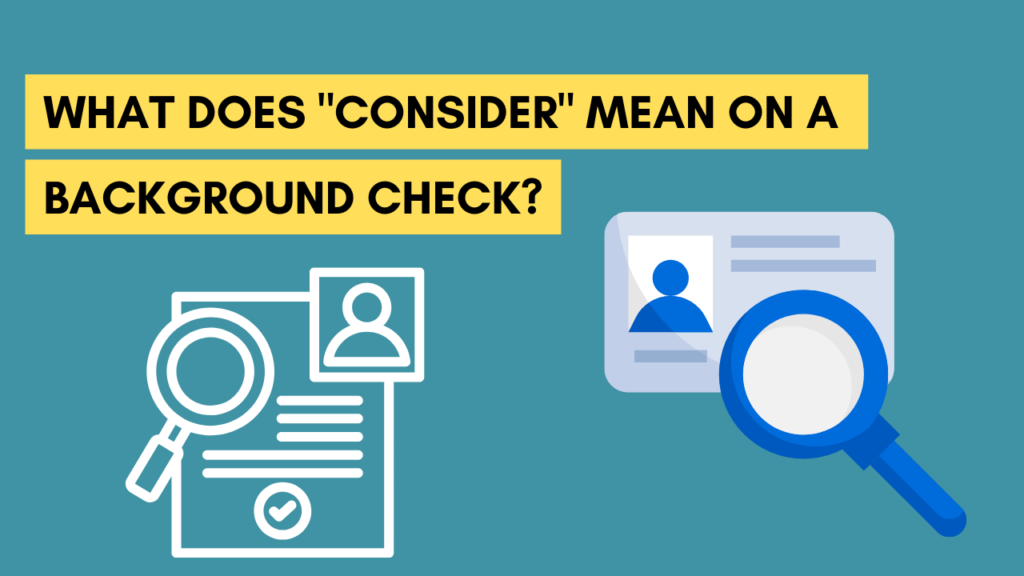
Background checks are a crucial part of the hiring process. Employers use them to verify the accuracy of a candidate’s resume and to ensure that the individual does not have a history that would make them unsuitable for the position. Sometimes, after a background check, the status comes back as “consider.” This can be confusing and stressful for job applicants. In this article, we will explore what the term “consider” means on a background check, its implications, and what steps you can take if your background check status is marked as “consider.”
Understanding Background Check Statuses
Background checks can return various statuses, such as “clear,” “complete,” “pending,” or “consider.” Each status has its own significance:
- Clear: No issues were found, and the candidate is deemed suitable for the position.
- Complete: The background check is finished, but it doesn’t specify the result.
- Pending: The background check is still in progress, and results are not yet available.
- Consider: There are potential issues that require further evaluation by the employer.
What Does “Consider” Mean on a Background Check?
Common Reasons for a “Consider” Status
Several factors can lead to a “consider” status on a background check:
- Criminal Records: Minor offenses or older charges that may not be directly relevant to the job.
- Inconsistent Information: Discrepancies between the information provided by the candidate and what is found during the check.
- Credit History: Financial issues, especially if the job involves handling money or financial information.
- Employment History: Unverifiable previous employment or gaps in employment.
- Education Verification: Discrepancies in educational qualifications.
Employment Background Check: Consider Status
Interpreting a “Consider” Status
Interpreting a “consider” status requires understanding the nature of the flagged information and its relevance to the job. Employers typically assess the severity and recency of any issues. They may also consider the candidate’s explanation for any discrepancies or negative findings.
Steps to Take if Your Background Check Status is “Consider”
If your background check status is marked as “consider,” there are several steps you can take:
- Request a Copy of the Report: Under the Fair Credit Reporting Act (FCRA), you have the right to request a copy of your background check report.
- Review the Report: Check for any errors or discrepancies that may have led to the “consider” status.
- Prepare an Explanation: Be ready to explain any issues in your background check during your follow-up interview.
- Provide Supporting Documents: If there are mitigating circumstances, such as expunged records or resolved financial issues, provide documentation to support your case.
Does “Consider” on a Background Check Mean Disqualification?
A “consider” status does not automatically mean disqualification. It simply means that the employer needs to take a closer look. Many candidates with a “consider” status still get hired, especially if the issues are minor or can be reasonably explained.
How Employers Handle a “Consider” Status
Employers typically have a process for handling “consider” statuses, which may include:
- Human Resources Review: HR may review the findings to determine their relevance to the job.
- Hiring Manager Input: The hiring manager may be consulted to understand the potential impact of the findings on job performance.
- Candidate Interview: The employer may schedule an additional interview with the candidate to discuss the findings.
- Decision Making: Based on all the information, the employer will decide whether to proceed with the hiring process.
Common Misconceptions About “Consider” Status
- Immediate Disqualification: Many people believe that “consider” means they are out of the running, but this is not necessarily true.
- Permanent Record: Some worry that a “consider” status will follow them forever, but background checks are specific to each employer and job application.
- No Chance to Explain: Candidates often think they won’t have a chance to explain the issues, but employers typically welcome clarifications.
Background Check Review Process
The review process for a “consider” status involves several steps:
- Initial Screening: The background check provider flags potential issues.
- Employer Notification: The employer is notified of the “consider” status.
- Further Investigation: The employer may investigate further or request additional information from the candidate.
- Final Decision: The employer makes a final decision based on the gathered information.
Employment Screening Results: What to Expect
When undergoing an employment background check, it’s important to understand that the results can vary:
- Clear: Indicates no issues were found.
- Consider: Indicates potential issues that need further review.
- Pending: The check is not yet complete.
Each of these statuses has different implications for your job application.
Job Background Check Outcomes
The outcome of a background check can significantly impact your job application:
- Positive Outcome: No issues found, or issues are deemed irrelevant.
- Conditional Outcome: Issues found but can be explained or mitigated.
- Negative Outcome: Issues found that are deemed disqualifying.
Understanding Background Check Statuses
Understanding the different background check statuses helps you prepare for the hiring process and respond appropriately to any findings.
What to Do if Your Background Check Status is “Consider”
If you find yourself with a “consider” status, take proactive steps:
- Contact the Employer: Reach out to the employer to discuss the findings and provide any necessary explanations.
- Seek Legal Advice: If you believe there are errors in your report, consider seeking legal advice.
- Stay Positive: Many candidates successfully address “consider” statuses and move forward in the hiring process.
Conclusion
Receiving a “consider” status on a background check can be daunting, but it doesn’t mean the end of your job prospects. By understanding what “consider” means and taking the appropriate steps to address any issues, you can navigate this challenge effectively. Remember, employers are looking for honest and capable candidates, and addressing a “consider” status with transparency and professionalism can ultimately work in your favor.
FAQs About “Consider” on a Background Check
What Does “consider” Mean on a Background Check?
“Consider” means that the background check has identified some information that requires further evaluation. It does not mean automatic disqualification but indicates that the employer should review the findings more closely before making a final decision.
Does “consider” on a Background Check mean I won’t get the Job?
Not necessarily. “Consider” means there are items that need further review. Many candidates with a “consider” status still get hired, especially if they can explain or mitigate the flagged issues.
How can I Find out why my Background Check is marked as “consider”?
You have the right to request a copy of your background check report. Reviewing the report can help you understand the reasons behind the “consider” status.
Can I contest the findings of my Background Check?
Yes, if you believe there are errors in your background check, you can dispute the findings with the background check provider. The Fair Credit Reporting Act (FCRA) gives you the right to dispute inaccuracies in your report.
Does a “consider” status affect my future job applications?
Each background check is specific to the employer and job application. A “consider” status on one background check does not necessarily impact future checks, especially if the flagged issues are resolved or explained.
What if my Background Check has incorrect information?
If your background check has incorrect information, you should immediately contact the background check provider to dispute the inaccuracies. Providing evidence to correct the information is crucial.

